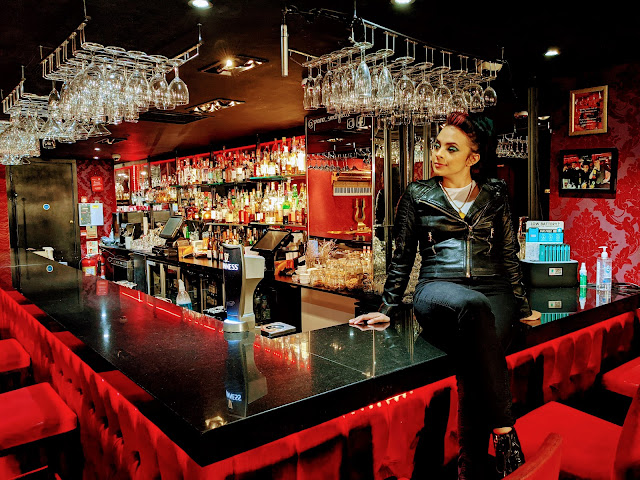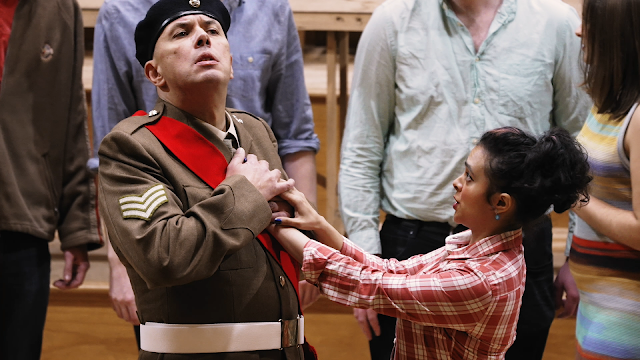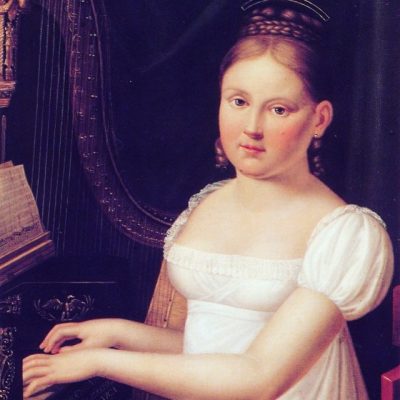 |
| Donizetti: Don Pasquale - Random Opera 2021 |
Random Opera Company, artistic director Richard Tegid Jones, is a relatively new company but it has a very lively schedule for the forthcoming season including productions of Weber's Der Freischütz and Bellini's La Sonnambula, plus the premiere of a new commission and plans to give the first performance of an opera by the 19th century Italian composer Marianna Bottini. I chatted to Richard recently to find out more.
Richard describes Random Opera Company as a personal project that just grew. Based in Rugby, Richard created the company in order to make opera more available in the local area and to expand the repertoire, as well as giving people more opportunities to enjoy and perform opera. Richard was singing principal roles with local amateur Gilbert and Sullivan groups when in 2010 he saw English Touring Opera and wanted to do something like that, so ended up creating Random Opera. For most of the company's life it was comfortably amateur but lockdown rather changed that.
With their October 2020 show cancelled, they decided to try and get something together, either a concert or a performance online. In the event there were both, and with so little work around they were able to use some amazing singers. The company realised that they needed to step things up and do something at a much higher standard and in the last 18 months the company has grown from there.
 |
| Donizetti: L'Elisir d'Amore - Random Opera 2021 |
Last month they released a film of Donizetti's L'Elisir d'Amore, recorded in October 2021 in the Temple Speech Room at Rugby School. Plans include a production of Weber's Der Freischütz in April and Bellini's La Sonnambula in July, plus a film of a new commission, The Heavenly Ledger by the young American composer Evan Henry and librettist John Klaes, who won Random Opera's composition competition last year. Further ahead, they are planning to perform Marianna Bottini's Elena e Gerardo.
Bottini was born in Lucca in 1802 and was well-regarded in her day. At the age of 18 she was admitted to the Accademia Filarmonica in Bologna as an 'honorary master composer' (for the Requiem that she wrote for her mother's funeral), an honour not awarded to Rossini till he was over 30. But she married at the age of 23 and stopped composing. Elena e Gerardo, written in 1822, was never performed. Ironically, the name by which she is known today is her married name, she was born Marianna Motroni-Andreozzi (daughter of a nobleman) and her husband was Marquis Lorenzo Bottini.
Richard was looking at plans for the 2022 season and decided that they ought to do more varied repertoire. He Googled female composers and saw that Bottini's opera was unperformed. The Istituto Musicale Luigi Boccherini in Lucca had a manuscript score of the opera and sent him a copy. Before that Richard did not know anything about Bottini and it has been a fascinating exercise digging out information and learning. The opera's libretto is based on a story by the 16th century writer Matteo Bandello who wrote the story on which Shakespeare's Romeo and Juliet is ultimately based. Elena e Gerardo is similar, there are two families at odds and a couple secretly married.
 |
| Marianna Bottini |
When I asked how the finance works, Richard smiled and said "painfully". Currently he mainly funds the company himself but he wants to build up the funding and develop a sustainable approach to live productions. Without a bed of patrons and donors to help with funding, they must cut their cloth to fit what they can do, but he makes sure that the singers are fairly compensated. Richard feels that there are too many opportunities for emerging artists where they are not adequately paid.
Inevitably, there are compromises and for their last show Richard directed, acted as stage manager and wrote the surtitles. The company is also concerned to maximise time during the rehearsal process. So, there is a detailed plan and singers know exactly when they are needed rather than being called for a generic period of time. This was driven by necessity but has a positive effect such as enabling singers with children to plan childcare; Richard has three children himself and so can plan his time. And as they are not able to pay a lot, it also means singers known when they are free to fit other work in.
Early in 2021, Richard felt the company should do new work as part of a drive to perform works that resonate with society today. Not knowing where to start with commissioning, the company decided to do a competition. And so that composers did not have to write works on spec for submission, they were asked to submit a proposal along with musical samples. The idea was for something that resonated today. The competition was judged by director (and librettist) Sir David Pountney, soprano Claire Rutter and conductor Martyn Brabbins (music director of English National Opera), and the winners were composer Evan Henry and librettist John Klaes. Their resulting work is The Heavenly Ledger. Their initial pitch was for a work about how algorithms control much of our lives. This has evolved into a story of someone trying to get into heaven and St. Peter's previous method of judging people has been replaced by computer software!
The company would like to do a live performance of the new opera, but initially they will be filming the piece and it will be closer to a film rather than a staged performance with cameras present. The opera is for mezzo-soprano, counter-tenor, baritone and bass with piano accompaniment. The competition specified the number of voices and piano accompaniment, so that the resulting work was achievable.
It turns out that film is something Richard is passionate about. Their 2021 production of Donizetti's Don Pasquale was filmed as a record but it grew into a bigger project, providing a showcase for the singers and being filmed in the Organ Room at Glyndebourne. Richard wants to develop film further as it it makes things more accessible. Their film of Mozart's Le nozze di Figaro, made during lockdown, has had 3000 views, which is a larger audience than would be achievable from those who live locally, and Richard is keen to look at different approaches to performing.
The production of Weber's Der Freischütz in April will be performed in German with spoken dialogue in German (in a standard cut version of the dialogue) with Philip Clieve as Max, Isolde Roxby as Agathe, Martin Lamb as Kaspar, and Becca Madden as Aenchen, directed by Richard Tegid Jones with Ashley Beauchamp as music director.
There were debates about what language(s) to perform the work in (Richard mentions the tradition of performing the arias in German and dialogue in English), and whether to do the dialogue at all. But Richard was concerned to offer the singers worthwhile opportunities and not perform a cut down version of the work. So it will be the full opera, in German with dialogue and with surtitles, and will be filmed.
Further information about performances from the Random Opera website.
Never miss out on future posts by following us
The blog is free, but I'd be delighted if you were to show your appreciation by buying me a coffee.
Elsewhere on this blog
- Urban dystopia: Guildhall School's double bill of Judith Weir's Miss Fortune and Menotti's The Telephone - opera review
- Elan and style: Grands Motets by Michel-Richard De Lalande from Sébastien Daucé and Ensemble Correspondances - record review
- Iceland: The Eternal Music - Graham Ross and the choir of Clare College explore the contemporary music of Iceland - record review
- A superbly engrossing performance: James Newby and Simon Lepper in Schubert's Die schöne Müllerin at Wigmore Hall - concert review
- English Touring Opera's revival of Puccini's La Boheme proves finely satisfying - opera review
- The Last Castrato: Max Hoehn and Torsten Rasch on their new collaboration as part of Opera21's platform for new opera - interview
- Manhattan to Montmartre: Bernstein and Gershwin transcriptions from Julian Jacobson and Mariko Brown - record review
- The cycle of life: Jamie Manton's new production of Janacek's The Cunning Little Vixen at English National Opera - opera review
- Phantasm completes its survey of all John Jenkins's viol consorts with a disc of his four-part consorts on Linn - record review
- Early Moderns: the (very) first Viennese School from American Baroque ensemble Quicksilver - record review
- Most pieces use the dichotomy between tonality and atonality: I chat to composer Eleanor Alberga about writing music - interview
- Certainly not traditional, but true to the work's spirit and dramaturgy: Edward Dick's production of Bizet's Carmen returns to Opera North with Chrystal E Williams back in the title role - opera review
- Home








%20Bill%20Smith_Norwich%20Cathedral.jpg)

No comments:
Post a Comment